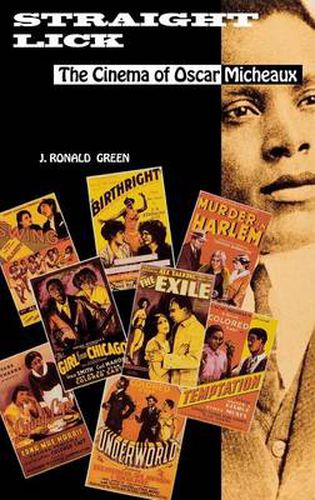Readings Newsletter
Become a Readings Member to make your shopping experience even easier.
Sign in or sign up for free!
You’re not far away from qualifying for FREE standard shipping within Australia
You’ve qualified for FREE standard shipping within Australia
The cart is loading…






This title is printed to order. This book may have been self-published. If so, we cannot guarantee the quality of the content. In the main most books will have gone through the editing process however some may not. We therefore suggest that you be aware of this before ordering this book. If in doubt check either the author or publisher’s details as we are unable to accept any returns unless they are faulty. Please contact us if you have any questions.
One of the most original and successful filmmakers of all time, Oscar Micheaux was born into a rural, working class, African-American family in mid-America in 1884. He was not formally educated beyond the most modest and basic public schooling; he was subjected all his life to race and class prejudice and yet he created an impressive legacy in one of the most sophisticated, expensive and fragile cultural endeavours of the 20th century - commerical cinema. Between 1913 and 1951 he wrote, directed and distributed some 43 feature films, more than any other black filmmaker in the world, a record of production that is likely to stand for a very long time. In African-American circles, the legend of Oscar Micheaux has peristed since the 1910s. Now stories of Micheaux’s life and work are extending into the rest of American culture through film festivals, museum and university film programmes and publications, and broadcasting. This book is a critical assessment of Micheaux’s accomplishment in the art of cinema. Micheaux’s work was founded upon the concern for class mobility, or uplift, for African-Americans. Uplift provided the context for Micheaux’s extensive commentary on racist cinema, such as D.W. Griffith’s 1915 blockbuster, The Birth of a Nation , which Micheaux answered with his very early films With Our Gates and Symbol of the Unconquered . Uplift explains Micheaux’s use of negative images of African-Americans as well as his multi-pronged campaign against stereotype and caricature in American culture. His campaign produced a body of films saturated with a nuanced intertextual signifying , boldly and repeatedly treating controversial topics that face white censorship time after time, topics ranging from white mob and Klan violence to light-skin-colour fetish to white financing of black cultural productions. Micheaux’s underfinanced films with their necessarily low production values, combined with his thematic concern for the political economics of representation, resulted in a virtually unique phenomenon - a large corpus of materially and philosophically middle-class films.
$9.00 standard shipping within Australia
FREE standard shipping within Australia for orders over $100.00
Express & International shipping calculated at checkout
This title is printed to order. This book may have been self-published. If so, we cannot guarantee the quality of the content. In the main most books will have gone through the editing process however some may not. We therefore suggest that you be aware of this before ordering this book. If in doubt check either the author or publisher’s details as we are unable to accept any returns unless they are faulty. Please contact us if you have any questions.
One of the most original and successful filmmakers of all time, Oscar Micheaux was born into a rural, working class, African-American family in mid-America in 1884. He was not formally educated beyond the most modest and basic public schooling; he was subjected all his life to race and class prejudice and yet he created an impressive legacy in one of the most sophisticated, expensive and fragile cultural endeavours of the 20th century - commerical cinema. Between 1913 and 1951 he wrote, directed and distributed some 43 feature films, more than any other black filmmaker in the world, a record of production that is likely to stand for a very long time. In African-American circles, the legend of Oscar Micheaux has peristed since the 1910s. Now stories of Micheaux’s life and work are extending into the rest of American culture through film festivals, museum and university film programmes and publications, and broadcasting. This book is a critical assessment of Micheaux’s accomplishment in the art of cinema. Micheaux’s work was founded upon the concern for class mobility, or uplift, for African-Americans. Uplift provided the context for Micheaux’s extensive commentary on racist cinema, such as D.W. Griffith’s 1915 blockbuster, The Birth of a Nation , which Micheaux answered with his very early films With Our Gates and Symbol of the Unconquered . Uplift explains Micheaux’s use of negative images of African-Americans as well as his multi-pronged campaign against stereotype and caricature in American culture. His campaign produced a body of films saturated with a nuanced intertextual signifying , boldly and repeatedly treating controversial topics that face white censorship time after time, topics ranging from white mob and Klan violence to light-skin-colour fetish to white financing of black cultural productions. Micheaux’s underfinanced films with their necessarily low production values, combined with his thematic concern for the political economics of representation, resulted in a virtually unique phenomenon - a large corpus of materially and philosophically middle-class films.